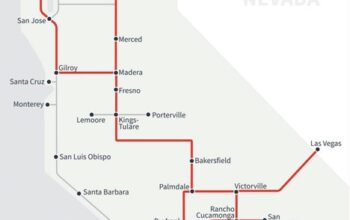Think California is broke now, wait till November, 2024. Newsom has the Wall Street cabal will put $52 billion worth of bonds on the State ballot. That is $26 billion for scam California projects—and $26 billion for Wall Street. When you add the city, county, school districts and special districts, the total of bonds on the November 2024 ballot will go over $100 billion. Great haul for Wall Streets and the special districts.
“The governor and others are weighing a complex set of political calculations as proposals advance in the Legislature, including whether to target the March primary ballot, when turnout will be lower and skew more conservative, or a crowded November ballot where a cluster of initiatives will compete for voters’ attention.
Then there are the practical constraints: The state generally avoids taking on excessive debt as a matter of fiscal caution and Wall Street financing’s capacity, with Newsom estimating the prudent limit at around $26 billion.
Democrats’ bond bills — added together — would tally more than $100 billion, though some overlap and would almost certainly be combined.
You would never know the State is losing population, revenue, has a $32 billion deficit that is growing—and will continue for the next five years, at the least. Better get out of California before taxes go up to pay for these scams.
Gavin Newsom poised to play $26 billion gatekeeper for California Democrats

The governor and lawmakers want to borrow money for housing, climate change and schools — but they’ll need to persuade votes.
By JEREMY B. WHITE, PoliticO, 7/24/23 https://www.politico.com/news/2023/07/24/gavin-newsom-democrats-gatekeeper-00107649
SACRAMENTO, Calif. — California is on the cusp of a borrowing bonanza as Democratic lawmakers line up tens of billions of dollars in bond proposals to pay for mental health treatment, schools and adapting to climate change.
But voters would need to sign off on the new debt. And everyone is looking to Gov. Gavin Newsom to settle how much to ask for and where to spend it — acknowledging that asking an economically anxious electorate for too much could mean inundating voters in 2024 and ending up empty-handed.
“A number of legislative leaders have come to me — ‘Hey, support this, support my bond, this bond,’” Newsom said at a recent press conference. “We have to work together on what the priorities are going to look like for November.”
The governor and others are weighing a complex set of political calculations as proposals advance in the Legislature, including whether to target the March primary ballot, when turnout will be lower and skew more conservative, or a crowded November ballot where a cluster of initiatives will compete for voters’ attention.
Then there are the practical constraints: The state generally avoids taking on excessive debt as a matter of fiscal caution and Wall Street financing’s capacity, with Newsom estimating the prudent limit at around $26 billion.
Democrats’ bond bills — added together — would tally more than $100 billion, though some overlap and would almost certainly be combined.
Newsom would have to sign off on any bond measure the Legislature approves with a two-thirds vote. He has signaled he’d like his proposal — to fund thousands of new mental health and substance use treatment slots — to sit alone on the March ballot, which would push other bonds to a November election teeming with high-stakes initiatives. Lawmakers have until October to place something before primary voters.
Here are the major proposals and players:
Behavioral health treatment
This is Newsom’s baby. The governor wants to ameliorate homelessness by channeling money into treatment for substance abuse and serious mental health disorders with a $4.68 billion bond that would fund up to 10,000 placements and housing for veterans. A companion policy bill changes how an existing, voter-passed mental health initiative allocates money.
Lawmakers have rallied behind the governor’s proposal, along with the California Professional Firefighters, who respond to addiction and mental health crises. Both measures are exceedingly likely to pass — and Newsom has emphasized he wants to focus on this before moving on to the other bond proposals.
Climate change
Flood prevention, water supplies, clean energy generation: There’s no shortage of ideas to help California adapt to a changing climate. Newsom backed a bond measure this year to offset his deficit-driven cuts to environmental programs.
Assemblymember Eduardo Garcia and state Sen. Ben Allen, Southern California Democrats, have proposed measures worth more than $15 billion. The parallel bills are parked in committee, at leadership’s request, as the players negotiate. There are also multiple flood-focused bond bills.
The Nature Conservancy has been heavily involved in negotiations, conducting polling on the ideal size and timing, along with an array of environmental and local government groups. Water politics will influence the outcome, with the Association of California Water Agencies and its members pushing for funding.
Education
Voters in 2020 decisively rejected the last statewide school construction bond despite Newsom backing the measure. Supporters say the need for school facility improvements has only increased since then, with the state estimating last year that needed upgrades would cost more than $7 billion.
But the bond’s failure has informed current negotiations as players look to avoid another rejection. One point of contention: whether to fund university facility projects. A $15 billion bond from state Sen. Steve Glazer would cover four-year colleges, while a $14 billion proposal from Assemblymember Al Muratsuchi would fund only K-12 schools and community colleges.
Glazer’s proposal has support from the University of California and California State University. Muratsuchi’s has marshaled a larger coalition that includes administrators, school boards, construction groups like the California Building Industry Association and the Coalition for Adequate School Housing, a group that spent heavily for the 2020 measure.
Housing
California faces a massive housing shortfall. Assembly Housing Chair Buffy Wicks, an Oakland Democrat, wants to make a dent with a $10 billion bond, much of which would flow to the state’s Multifamily Housing Program to construct and renovate housing for low-income Californians. State Sen. Anthony Portantino is pursuing a separate mortgage and construction bond that, at its current $25 billion, would swallow up the entire bond budget.
Wicks has some powerful allies in supporters like the California Apartment Association, which represents landlords, and the California Housing Consortium. The State Building and Construction Trades Council union group supports Portantino’s measure.
Wicks acknowledged in an interview that there are limits to what voters would accept and said she’s working with Newsom on a coordinated housing response. The governor has called a potential housing measure “a big part” of negotiations.
“What I want to avoid is housing fatigue on the ballot,” Wicks said. “I don’t want five housing bonds on the ballot and voters go ‘uhhh, I don’t know.’



